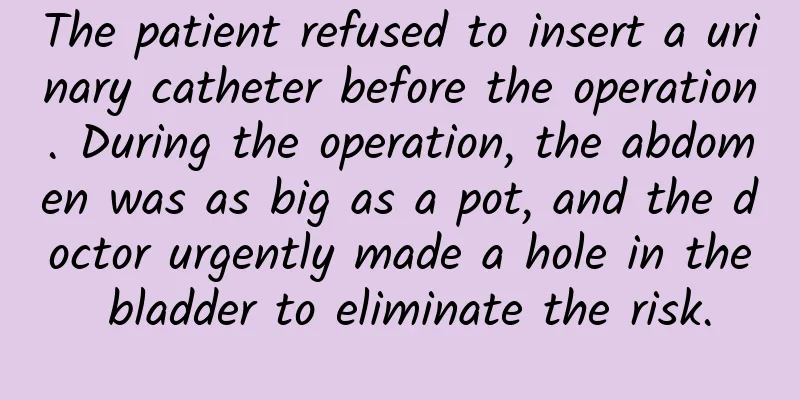The patient refused to insert a urinary catheter before the operation. During the operation, the abdomen was as big as a pot, and the doctor urgently made a hole in the bladder to eliminate the risk.

|
78-year-old Wang is in good health. Although he lives in a building, he can't stay idle. He has a piece of land next to the building and has been working in the field throughout the spring. However, he was old after all. One time when he was carrying water, he suddenly felt severe stomach pain. So his family rushed him to a nearby hospital. After arriving at the hospital, the doctor diagnosed that he was suffering from a hernia. He had never had an injection in his life, and he still couldn't understand how he got sick. After the pain eased a little, he insisted on going home to take care of the garden. Faced with this situation, the doctor certainly could not agree to his request. After repeated persuasion, he finally agreed to the operation. So the doctor began to prepare for the operation. However, during the anesthesia visit the day before the operation, the anesthesiologist still found a number of problems. These seemingly minor problems are likely to affect the safety of the operation. For example, he has a history of hypertension for nearly 20 years. Crucially, he has never taken antihypertensive drugs systematically. In addition, ultrasound showed that Mr. Wang had severe prostate hyperplasia and calcification. According to him, peeing is a very painful thing. At that moment, he had to admit that he was old. In the past, he also "peed three feet into the wind". Now he can only "wet his shoes even with the wind". Faced with this situation, the Department of Anesthesiology urgently communicated with colleagues in surgery and nursing. Although the operation is minor, a large amount of fluid may be infused during the operation to prevent hypotension, so it is very likely that a large amount of urine will be produced. This means that it is very necessary to insert a urinary catheter. However, the actual situation of the patient himself and his firm opinion on not inserting a urinary catheter cannot be ignored. The nursing colleague also said that it was very difficult to insert a catheter into the prostate gland and that it could only be done experimentally. As a result, the discussion came to a standstill. Finally, after fully soliciting the opinion of Mr. Wang, it was decided to try to insert a urinary catheter on the morning of the operation day, and decide whether to insert the catheter based on the situation after anesthesia. However, things did not go as planned: on the day of the operation, Mr. Wang resolutely refused to try to insert a catheter. Moreover, he said that if the insertion of the catheter caused him to be unable to urinate in the future, the hospital would have to pay compensation. When they heard that the patient was asking for compensation, no one dared to insist. So, Old Man Wang was pushed onto the operating table. Originally, we considered inserting a urinary catheter after anesthesia. However, due to the sudden change in the patient's attitude, we could only wait and see. Unexpectedly, after anesthesia, Mr. Wang's blood pressure fluctuated greatly, and the anesthesiologist could only speed up the drip. After all the hard work, the blood pressure finally stabilized, and the operation entered the preparation stage of disinfection and draping. At this moment, the doctor in charge of disinfection said in surprise: Why is the patient's belly so big? Hearing this, everyone stopped what they were doing and looked in the direction of the sound. As expected, Old Man Wang's belly was very bulging. Basically, it could be described as "as big as a pot". When tapping the lower abdomen, there was a sound of water. Considering that Mr. Wang refused to insert a urinary catheter, it was almost certain that there must be urine inside. Therefore, no one cared about Mr. Wang's determination before anesthesia. The most urgent task was to solve the problem of a large amount of urine in the bladder. So the nurse also quickly started to insert the urinary catheter. During this process, everyone actually had questions. How could so much urine be produced in such a short time? If you want to recall, you can't stop moving your hands. However, after several people took over, they were ultimately unable to insert the catheter. As there was no other choice, the general surgery department invited the urology department. I thought urology could solve this problem. However, the urology department was helpless and tried a urethral probe, which was also fruitless. As time passed, the urology department suggested: To avoid urethral damage caused by repeated catheterization. At present, considering the severity of the disease, urination should be performed immediately. To prevent postoperative urine retention, it is best to perform a temporary bladder fistula and remove the fistula tube on the second day after surgery. Soon, with the help of a colleague from the urology department, a hole was opened in the bladder. Instantly, urine gushed out, showing that there was indeed a lot of urine stored. After the urology department helped to create the fistula, the general surgery operation officially began. During the operation, someone raised the question, "Why is there so much urine?" At this time, the anesthesiologist was not too busy, so he began to analyze the various special features of Mr. Wang's condition, hoping to find the cause. Suddenly, he realized: The reason why Old Man Wang urinates so much is not because we did not insert the catheter in time. Next, he shared his analysis ideas with everyone in detail: First of all, Mr. Wang had long-term prostate hyperplasia, which caused him to have difficulty urinating, so his bladder had been in a state of long-term retention of large amounts of urine. However, without the muscle relaxant effect of anesthesia, it was not so obvious. Secondly, during his hospitalization, he took oral antihypertensive drugs, including diuretics, which caused him to produce more urine than normal people. Secondly, the rapid fluid replacement after entering the operating room also provides sufficient liquid basis for urine production. Finally, and often overlooked: During the anesthesia induction and intubation phase, anesthesiologists used dopamine to prevent circulatory fluctuations in patients. A small dose of dopamine has a diuretic effect. It was the combined effect of these conditions that eventually led to a large amount of urine in Mr. Wang's bladder. In the end, the risk was resolved even though the family members still didn't quite understand. |
Recommend
What is cervical conization surgery
Maybe you are still unfamiliar with cervical coni...
Can girls eat hawthorn during menstruation?
Hawthorn fruit is rich in pectin, which is a good...
What is the success rate of repair membrane?
China is a relatively conservative country in ter...
Unbearable vaginal itching
The female vagina is very sensitive. If affected ...
What to do if leucorrhea is thick and smelly
There are many embarrassing things for women, esp...
Is it normal to have menstruation every month?
Female friends all know that women's menstrua...
What should I do if my menstruation is delayed and my leucorrhea increases?
Abnormal leucorrhea and irregular menstruation ar...
What are the benefits of drinking chrysanthemum tea in summer? Is it good for women to drink chrysanthemum tea?
Chrysanthemum tea is a herbal tea made from chrysa...
【Ovarian Health】How to check for polycystic ovary syndrome?
Polycystic ovary syndrome is a disease that has a...
What are the reasons for weakened intestinal motility in parturients?
Many women will experience abdominal distension o...
What are the symptoms of female infertility?
In life, there are many people suffering from inf...
Symptoms of pelvic congestion syndrome, let you understand the real situation
If pelvic congestion occurs, the patient will exp...
Will the follicles grow after the night injection?
Oocytes are a prerequisite for the development of...
Why does septate uterus occur?
Why does septate uterus malformation occur? I bel...
Can people with breast fibroids eat eggs?
Every woman wants to have a pair of plump breasts...









